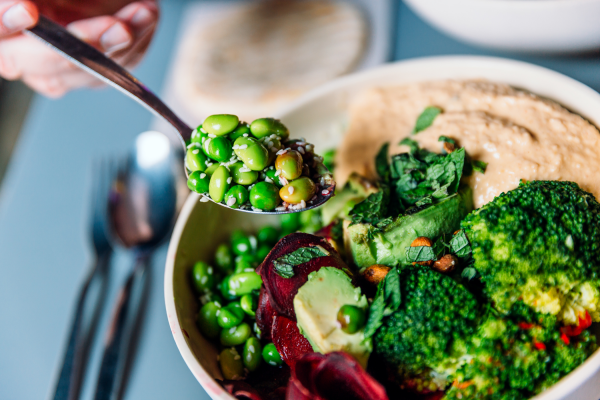
Are you considering going completely plant-based? Although there are of course a lot of advantages, there are also a number of pitfalls that you should take into account. Our expert Sandra van Leeuwen, Hormone Factor Trainer and Hormone Coach, shares 5 pitfalls of a completely plant-based diet and useful guidelines for a healthy vegan diet.
Let me state that all diets in which macronutrients and/or food products are excluded have risks. Namely the risk that you will develop nutrient deficiencies in the short or long term.
Every macronutrient (fats, proteins and carbohydrates) is important for our body in several ways. For example, fats are the building blocks of our sex hormones and a very low-fat diet can therefore lead to a disturbed cycle.
Also look at your goal when choosing a (temporary) diet. Do you have a very active life or not? The key here is to keep in touch with your body. What does it indicate? Does a certain diet make you active or sluggish? Do you sleep poorly, do you become depressed or do you develop an allergy or headache? These are all signs that you should take a serious look at, as far as I'm concerned.
And, finally, nothing stays the same. So always dare to make a choice. Life changes and with it your personal needs. That applies not only to the choice of a house or job, but also to your diet.
What are the-benefits of eating a plant-based diet?
- A proven lower risk of diabetes 2
- A proven lower risk of cardiovascular disease
- Contains more antioxidants (necessary as a daily balance against toxic substances that you ingest through breathing, nutrition and stress)
- Provides a better functioning of the intestines as a result of a higher fiber intake
- Leads to a lower acidification of the body. Acidification is caused by stress, poor bowel function and eating meat.
And last, but certainly not least:with a plant-based diet you ensure better animal welfare and the environment!
What-to-watch-with-vegetable-food?
- When we follow a diet for a longer period of time, there is a risk of one-sided eating. So be alert to this and continue to vary your diet.
- Do you exercise intensively or do you have a demanding job? Then realize that adding extra proteins, for example, is important.
- Choose the combination of several different types of vegetable protein sources to arrive at 1 complete protein.
- Increase the intake of (raw) fruit and vegetables step by step. Adding more fiber to your diet can take some getting used to for your gut at first. So let your intestines get used to this slowly
- There is an increased risk of the intake of phytic acid. Nuts and legumes are often chosen to replace meat. These contain phytic acids, which can cause digestive problems when ingested at high levels.
Phytin is an antinutrient and is produced by a plant to protect itself. It is difficult for us to digest. You can find it in nuts, legumes, coffee, grains and cocoa.


General-guidelines for a (plant-based) diet:
- Vary with food. That way there is a good chance that you are getting enough different nutrients. In addition, it also reduces the risk of developing intolerances to certain food products.
- Add these protein sources:beans, lentils, quinoa, buckwheat and sprouts such as broccoli sprouts, bean sprouts and alfalfa.
- When using phytic acid-rich foods, always try to soak them overnight (for example, with nuts and oatmeal).
- Include omega-3 fatty acids in your diet. For example, you can use nuts, chlorella and spirulina.
- Don't you eat bread either? Then occasionally put seaweed on the menu. This prevents a shortage of iodine in the long term.
- Keep your stress level under control. Stress costs extra vitamins and minerals. Less stress means less chance of shortages.
- Do you exercise intensively for a period of time or do you experience a greater degree of stress? Then add protein powder to the daily requirement of protein, for example.
- Use soy (products) in moderation. The risk of an intolerance to soy is greater in the west. They are often processed and can cause problems with your gut. Do you choose soy? In any case, use the organic, fermented variety.
- We get energy from our food which is divided into macronutrients. Make sure you have this distribution in order so that you get enough of everything. For example, use a nutrition app.


